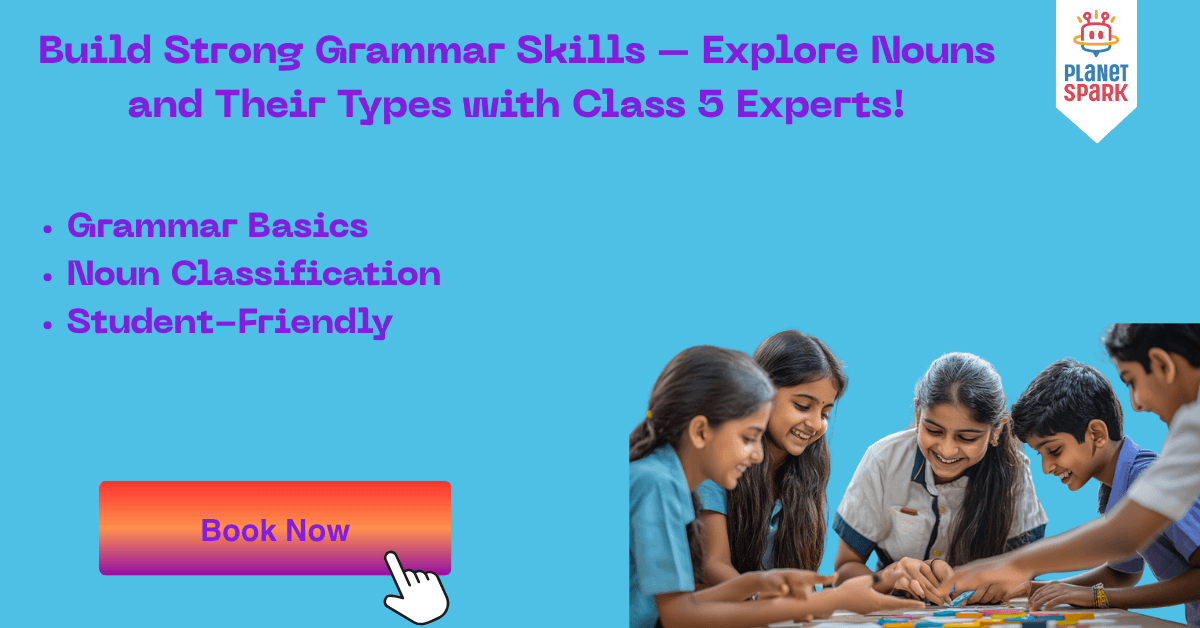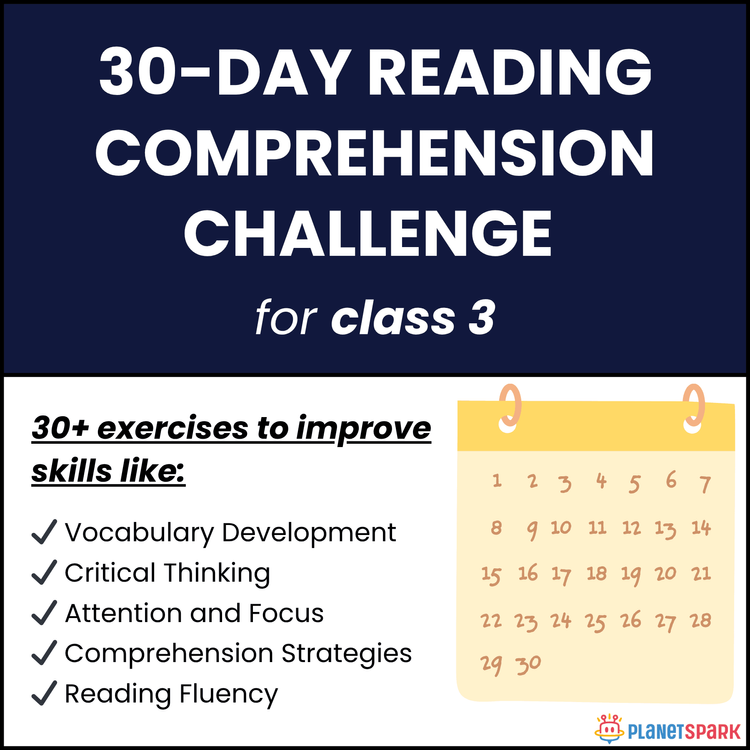Nouns and Their Types for Class 5 | Meaning, Examples & Uses

Table of Contents
- Tips to Identify Types of Nouns Easily
- Teaching Grammar: Context & Interaction Matter
- Benefits of Strong Grammar Focus for Children
- Why Class 5 Students Struggle with Nouns and How to Help
- Fun Activities to Learn Nouns and Their Types
- School Board Alignment & Academic Benefits
- Conclusion: Grammar with Context, Research, and Real Results
Nouns form the foundation of English communication. For Class 5 students, understanding nouns is essential as it builds the grammar base needed for more advanced writing and speaking tasks. A strong grasp of nouns enhances vocabulary, promotes structured thinking, and empowers students to communicate effectively in school and everyday life.
At PlanetSpark, we understand the importance of early grammar education. Our English Grammar Courses for Kids combine fun learning with real-life application, ensuring children not only understand grammar concepts but use them confidently.
What is a Noun?
A noun is a word that names a person, place, thing, animal, or idea. It is also called a naming word and forms the core of most English sentences. Without nouns, forming meaningful sentences would be impossible.
Examples of Nouns:
- People: teacher, Riya, brother
- Places: school, Delhi, park
- Things: pencil, ball, mobile
- Animals: dog, elephant, cat
- Ideas: freedom, honesty, anger
Why Are Nouns Important in Class 5?
By Class 5, students begin expressing themselves through longer sentences, essays, and speeches. Understanding nouns helps in:
- Building grammatically correct sentences
- Improving storytelling and writing skills
- Scoring well in grammar and composition exams
- Enhancing everyday communication
PlanetSpark’s curriculum ensures students not only learn but also actively use grammar in real-world situations.

Types of Nouns for Class 5
Class 5 students are expected to know and identify five major types of nouns. Let’s explore each:
Proper Nouns
These are specific names of people, places, or things and always begin with a capital letter.
Examples:
- People: Mahatma Gandhi, Priya
- Places: Mumbai, India
- Things: Google, Taj Mahal
Tip: If the noun names a unique item, it’s a proper noun.
Common Nouns
These refer to general names of people, places, or things.
Examples:
- People: girl, doctor
- Places: city, garden
- Things: pen, car
Tip: If the word can describe many items, it’s a common noun.
Collective Nouns
These describe a group of people, animals, or things as one unit.
Examples:
- A bunch of grapes
- A herd of cows
- A class of students
Tip: Though they refer to a group, collective nouns are usually treated as singular.
Abstract Nouns
These refer to ideas, emotions, or qualities that cannot be seen or touched.
Examples:
- Bravery
- Honesty
- Anger
- Love
Tip: Abstract nouns are usually formed from adjectives or verbs (e.g., brave → bravery).
Material Nouns
These are names of materials or substances used to make other things.
Examples:
- Gold, iron, water, wood
Tip: Material nouns are usually uncountable and used in the singular form.
Concrete vs. Abstract Nouns
Concrete Nouns
Things you can see, touch, smell, hear, or taste.
Examples: apple, car, teacher
Abstract Nouns
Things you cannot touch or see but can feel or understand.
Examples: kindness, fear, intelligence
Countable Nouns
These are nouns that can be counted.
- Examples: apple, chair, pen, student
- Sentence: I have three apples.
Uncountable Nouns
Tips to Identify Types of Nouns Easily
Here’s how students can remember and identify different types of nouns:
- Ask: Is it a specific name? → Proper Noun
- Is it a general item or a name? → Common Noun
- Is it a group? → Collective Noun
- Is it something you can’t touch? → Abstract Noun
- Is it a substance? → Material Noun
- Can you count it? → Countable Noun
- Can you not count it? → Uncountable Noun
Teaching Grammar: Context & Interaction Matter
Research consistently shows grammar learning is most effective when taught in context and tied to authentic language use, not isolated rule drills.
Effective methods include:
Interactive Activities: life maps, picture books, noun hunts, charades
Blend direct instruction with practice: explain, then let kids produce sentences or stories
Visual & game-based techniques: Noun Bingo, grammar quizzes, collages, storytelling sessions
PlanetSpark employs all of the above through its deductive and inductive teaching methods: interactive storytelling, animated lessons, worksheets, quizzes, and group challenges.
Confused between common and proper nouns? Join PlanetSpark’s free trial class and make grammar a breeze for your child!
How Nouns Work in Sentences
Nouns as Subjects
The subject of a sentence is often a noun.
Example: Ananya plays the violin.
Nouns as Objects
The noun receiving the action.
Example: She baked a cake. ('cake' is the object)
Singular and Plural Forms of Nouns
| Singular | Plural |
|---|---|
| book | books |
| glass | glasses |
| tomato | tomatoes |
| child | children |
Tips for Forming Plurals:
- Add ‘s’ or ‘es’ to most nouns
- Change spelling in some cases (man → men)
- Some nouns don’t change (sheep → sheep)
Exceptions in Noun Usage
- Always Plural Nouns: scissors, trousers
- Plural Form, Singular Meaning: news, mathematics
- Singular Form, Plural Meaning: people, cattle
- Same in Singular and Plural: deer, sheep
These exceptions often confuse children, but PlanetSpark simplifies them using real-life examples.
Struggling with grammar rules at home? Let PlanetSpark’s expert tutors help. Start your child’s free grammar trial today!
Benefits of Strong Grammar Focus for Children
Teaching grammar, including proper use of nouns, brings multiple holistic benefits:
Enhances reading comprehension - children can parse complex sentences
Improves writing clarity - organizes thoughts coherently
Builds digital literacy - understanding grammar helps children use tools like Grammarly or autocorrect wisely
Supports overall language development and new language learning
Makes grammar accessible and meaningful for learners at varied levels - avoids elitist assumptions that some children "don’t need grammar"
Why Class 5 Students Struggle with Nouns and How to Help
Many Class 5 students confuse types of nouns or forget the rules when writing. Here's why this happens:
- Lack of regular revision
- Not enough real-life usage
- Overlapping definitions (e.g., abstract vs. material)
- Memorizing instead of understanding
Solutions:
- Use real-life examples and storytelling
- Practice through games and activities
- Encourage writing exercises
- Regular quizzes for reinforcement
Fun Activities to Learn Nouns and Their Types
Engaging students in grammar becomes easier when it’s fun. Here are some activity ideas:
1. Noun Sorting Game
Give students a list of words and ask them to sort them into proper, common, collective, etc.
2. Noun Scavenger Hunt
Let students explore the classroom or home and collect nouns by type. For example:
- Proper Noun: Name of a book
- Material Noun: Spoon (metal)
- Collective Noun: Deck of cards
3. Noun Bingo
Make bingo cards with different types of nouns and play a class-wide game!
4. Story Creation
Ask students to write a short story using at least two of each noun type. This boosts creativity and grammar skills simultaneously.
5. Fill in the Blanks
Give sentences with missing nouns and ask students to fill them with the correct types.
Struggling with grammar rules at home? Let PlanetSpark’s expert tutors help. Start your child’s free grammar trial today!
Why PlanetSpark’s English Grammar Course is Ideal for Your Child
PlanetSpark’s English Grammar Course offers more than textbook learning. It’s built around:
1:1 Personal Trainers for Every Child
- Certified experts tailor lessons to your child’s style
- Real-time feedback during live sessions
- Focus on grammar, storytelling, and public speaking
Personalised Learning Roadmap
- Skills assessment to design a custom path
- Regular updates based on progress
- Step-by-step grammar mastery
SparkX: AI-Enabled Video Analysis
- Tracks grammar, fluency, and voice clarity
- Measures sentence structure and confidence
- Offers performance reports and suggestions
AI-Led Practice Sessions
- Speak with a virtual coach
- Instant feedback on fluency and grammar
- Practice speeches and stories anytime
Spark Diary
- Daily digital journaling to build writing skills
- Prompts and story ideas from trainers
- Tracks consistency and creative growth
Gamified Learning
- Grammar Guru Challenge
- Word Wisdom and Antonyms Quiz
- Daily quizzes and vocabulary games
Regular Parent-Teacher Meetings (PTMs)
- In-depth performance discussions
- Joint goal setting for future improvement
Comprehensive Progress Reports
- Tracks grammar, vocabulary, expression, and confidence
- Trainer notes and action plans
Learning Clubs
- Debate Club, Writers Guild, Story Circles, and more
- Encourage teamwork, creativity, and leadership
Sparkline Platform
- Safe, moderated content sharing by kids
- Builds digital confidence
Contests and Showcases
- Storytelling, poetry, and public speaking contests
- Real-time recognition and certificates
SparkBee and SparkShop
- Interactive quizzes, spelling games, and grammar tools
- Engaging eBooks tailored to different age levels
Build a strong grammar foundation with live expert guidance. Enroll in a free PlanetSpark class now, limited slots available!
School Board Alignment & Academic Benefits
PlanetSpark’s curriculum aligns with CBSE, ICSE, and similar board requirements, including Class 5 noun syllabus, revision sheets, and assessment patterns. Students experience:
Long-term retention via daily practice
Performance gains in the school grammar and composition sections
Enhanced storytelling and expressive writing skills
Conclusion: Grammar with Context, Research, and Real Results
Understanding nouns and their types lets Class 5 students express ideas, craft better sentences, and approach writing and speaking with confidence. Empirical research supports context‑based grammar learning to improve cognition, comprehension, and communication impact.
PlanetSpark elevates this approach with personalized coaching, AI-powered feedback, interactive tools, and gamified learning. If you aim to give your child not just grammar knowledge but confident language skills, book a FREE trial class with PlanetSpark today.
FAQs
Q1. What is a noun, and why is it important for Class 5?
A noun is a word that names a person, place, thing, or idea. It helps students build structured sentences and express thoughts clearly.
Q2. How many types of nouns should Class 5 students learn?
Five types: proper, common, collective, abstract, and material nouns.
Q3. How can children easily remember noun types?
By doing fun activities like sorting games, writing challenges, and using visual aids like charts.
Q4. What are examples of concrete and abstract nouns?
Concrete: dog, apple, teacher. Abstract: love, courage, honesty.
Q5. Does PlanetSpark teach grammar using fun activities?
Yes! PlanetSpark utilizes games, storytelling, videos, and quizzes to teach grammar engagingly.
Q6. What makes PlanetSpark different from other English classes?
It offers 1:1 live classes, AI-powered feedback, gamified tools, and a personalised curriculum.
Q7.Does PlanetSpark align with school curriculum expectations?
Yes. It covers CBSE, ICSE, and other major board requirements, ensuring students excel academically while building foundational language skills.
Download Free Worksheets
Personalized Communication Report
Record a video to get a AI generated personalized communication report for your child


